Iranian Officials, Media Push Narrative On IRGC Commander's Death
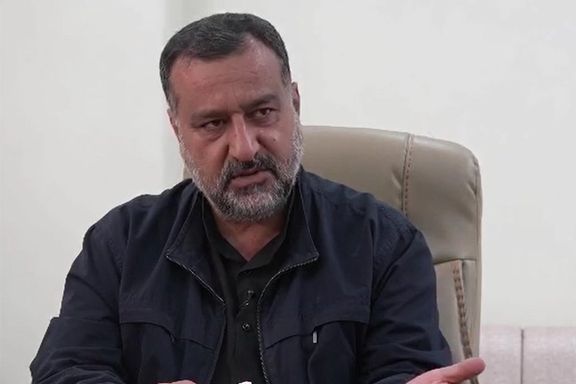
Officials and government-controlled media In Iran continue to praise the contributions of senior IRGC officer Razi Mousavi, who was killed in Syria on December 25.

Officials and government-controlled media In Iran continue to praise the contributions of senior IRGC officer Razi Mousavi, who was killed in Syria on December 25.
Mousavi was killed in an air strike allegedly conducted by Israel. He is being praised for his role in strengthening Iran's proxy forces in the region that Tehran calls the "Axis of Resistance." His death is seen as a blow to the Iranian regime amid Israel's war against Hamas.
Palestinian militant groups, the Syrian regime, the Lebanese militant group Hezbollah and Yemen's Houthis are the main forces aligned with and supported by the Iranian regime.
The IRGC-affiliated Tasnim news agency published an interview with one of Mousavi's colleagues, identified only as Haj Hassan, on Saturday. Tasnim cited "security considerations" for not disclosing his full name.
According to Haj Hassan, Mousavi played a crucial role in transferring assistance to proxy forces through relations with Syrian and Lebanese officials. He was also credited with creating conditions for the ‘resistance axis’ that allowed for the production of essential items locally.
"The transfer of equipment and the necessary technology for production within the resistance axis was one of Mousavi's characteristics during these years. In challenging conditions, he implemented fundamental strategies to sustain resistance over the course of three decades," Haj Hassan added.
Thousands gathered for his funeral in Tehran's central Imam Hossein Square, where mourners passionately chanted anti-Israel and anti-American slogans. Yellow flags bearing the message "I am your opponent" were waved by the crowd, directly targeting Israel.
During the funeral, Iran's Supreme Leader, Ali Khamenei, led prayers and paid tribute to Mousavi, further solidifying the official narrative surrounding the senior IRGC official's role and impact.
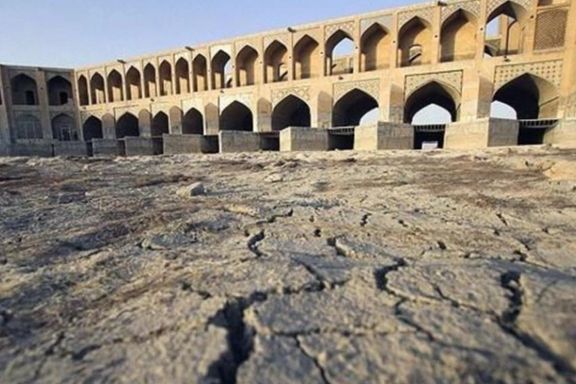
Iran is grappling with one of its most severe droughts in over five decades, marking the fourth consecutive year of serious water scarcity.
In a televised debate on Friday, Hashem Amini, the CEO of the Iranian Water and Wastewater Engineering Company emphasized that “autumn precipitation levels have plummeted by about 6 percent compared to the previous year, raising concerns about an impending drought.”
Despite Iran's historical experience with low precipitation conditions, the persistent drought has sparked criticism of the Iranian government's environmental mismanagement.
The latest revelation comes four months after protests erupted in Tabriz against mismanagement that contributed to the disappearance of Lake Urmia, once the largest lake in the Middle East. The lake has significantly shrunk due to a combination of water mismanagement and the impacts of climate change.
Earlier, Ali Salajegheh, the head of the Department of Environment, suggested that the drought might be the result of hostile foreign actions. "It is not unlikely that Iran's drought on a small scale is the result of hostile actions, but research in this area has not yet been conducted."
In 2018, the government arrested several Iranian environmentalists on charges of espionage for the US and UK governments. The convictions have resulted in prison sentences, raising concerns about the state of environmental activism in the country.
Reports indicate that a quarter of Iran's farmers have lost their livelihood in the past seven years, primarily due to water scarcity. The consequences of drought and water shortages extend beyond economic impacts, leading to soil erosion, desertification, and hazardous dust storms that affect approximately half of Iran's population, according to the country's health ministry.

Judges and judicial officials of the Islamic Republic visiting Tehran’s Evin Prison encountered escalating protests from women political prisoners on Wednesday.
The incident happened when a group of high-ranking judiciary officials paid a visit to the notorious jail, informed sources told Iran International.
The female detainees boldly chanted slogans and sang revolutionary songs, demanding an end to what they perceive as oppressive policies of the Iranian judiciary. Dozens of women human rights and political activists are kept in Evin Prison, including the 2023 Nobel Peace Prize laureate Narges Mohammadi.
Chanting "Death to the dictator," "Death to the Islamic Republic," and "Woman, Life, Freedom," the women prisoners expressed their anger and rejection against the suppression of the people, imprisonment of dissidents, torture, and executions.
Sources close to the families of the detainees told Iran International that in a bold move, some of the women went to the prison staff corridor, where they chanted slogans. The guards promptly responded by locking the doors to the rooms where Islamic Republic judicial officials were present.
Mizan, the official news agency of the judiciary of the Islamic Republic, reported that 250 judges and judicial officials from Tehran Province visited Evin Prison on Wednesday.
Among the officials were judges from Revolutionary Courts that deal with political cases. The group included Iman Afshari, the head of Revolutionary Court Branch 26, Mohammad-Reza Amouzad, the head of Branch 28, Ali Ghenaat-Kar, the acting head of the Security Court, Ali Alqasi Mehr, the head of the judiciary of Tehran Province, and several security personnel.
Standing in front of the locked doors, the women prisoners addressed the visitors, emphasizing that their demonstration was not about their individual cases, but to protest the repressive policies of the Iranian judiciary. They accused judges, such as Afshari and Amouzad, of issuing and executing unjust and inhumane sentences, particularly targeting protesters.
Iran’s Judiciary is unlike most other countries in the world. It encapsulates both prosecutors and judges, who often act based on advice from security and intelligence organs. Judges are not independent, but employees of the all-powerful Judiciary, which is controlled by the Supreme Leader, and not the Ministry of Justice.
The prisoners continually shouted the name of Mohsen Shekari, a protester who was hanged in Dember 2022, drawing attention to judges like Mohammad Reza Amouzad, who had issued his execution order and were allegedly hiding among security forces inside the rooms.
The Islamic Republic has executed at least eight protesters, including Shekari, who were arrested in connection with the 2022 anti-government protests.
As the prisoners’ demonstration unfolded, the number of guards and security personnel increased around their wards. Despite efforts by guards and prison officials to push them back, the female prisoners remained steadfast, demanding accountability for what they deemed as crimes committed by the individuals present.
In response, security forces asserted that the prisoners could only request information about their individual cases. However, the protesting prisoners clarified their purpose, stating, "We are here to announce that the judiciary must stop the death machine," referring to execution. This year alone, Iran has executed nearly 750 people, most for drug offences and murder cases.
The prisoners continued to chant slogans such as "Shameless, Shameless," "Killer, Go Away," and the visiting officials hurriedly exited the administrative rooms of the women's ward.
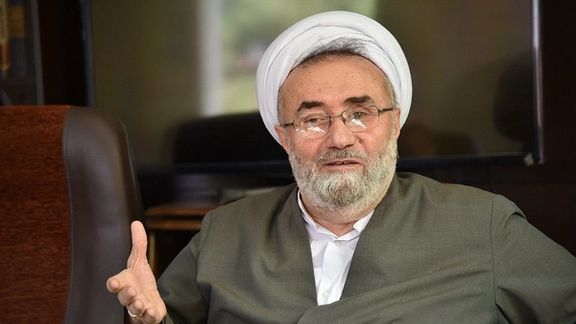
The conservative Iranian newspaper Jomhuri Eslami said on Saturday that the Ministry of Culture has halted government advertisements because it critical stance.
Masih Mohajeri, a cleric and long-time managing editor, disclosed the development emphasizing the administration's intolerance of criticism.
Mohajeri stated, "They [the Raisi administration] cannot tolerate any criticism and believe that the media should unquestioningly serve the government's objectives."
The newspaper has consistently scrutinized President Ebrahim Raisi's economic and foreign policies over the past two years.
In September, Jomhouri-e Eslami joined the chorus condemning the censorship of critical media outlets by ruling hardliners. The paper emphasized the need for a relationship between the government and the media characterized by "mutual respect" to uphold professional standards.
By August, midway through Raisi's presidency, the newspaper asserted that Raisi could no longer attribute his failures to the previous government. It highlighted Raisi's substantial support from Supreme Leader Ali Khamenei and like-minded conservatives dominating other branches of the government. Despite Raisi's initial belief that he could manage the state without a balanced foreign policy, the paper argued that the country's situation and the impact of foreign policy on worsening conditions required a more nuanced approach.
Jomhouri-e Eslami (Islamic Republic) also underscored alarming economic indicators, including an 83-percent increase in printing money, a 95-percent rise in the US dollar exchange rate, and a 114-percent price hike for essential goods. According to the paper, these figures reveal Raisi and his colleagues' lack of understanding of the country's conditions and the consequences of their confrontational foreign policy decisions.

The Israeli Defense Forces announced that they attacked targets in Syria early Saturday, responding to fire from the country, where Iran-affiliated forces are active.
The IDF also said it struck Hezbollah “terror infrastructure” in southern Lebanon, including a launch site used by the Iran-backed group following a number of cross-border attacks earlier Friday.
Arab media also reported that unidentified aircraft attacked Iran-linked targets in eastern Syria on Friday.
Local sources reported multiple casualties with different figures, according to some Arab media. Lebanon’s Al Mayadeen said some casualties were Lebanese. Al Arabiya's Arabic television quoted a “security source” to report that eight trucks entering Syria from Iraq had been destroyed.
However, there has been no word from the United States about an attack. Washington announces its air strikes on Iran-affiliated targets, unlike Israel that usually prefers to say nothing. This in turn led to some observers saying that perhaps the reported attack allegedly on weapons depots and trucks carrying Iranian supplies, were conducted by Israel.
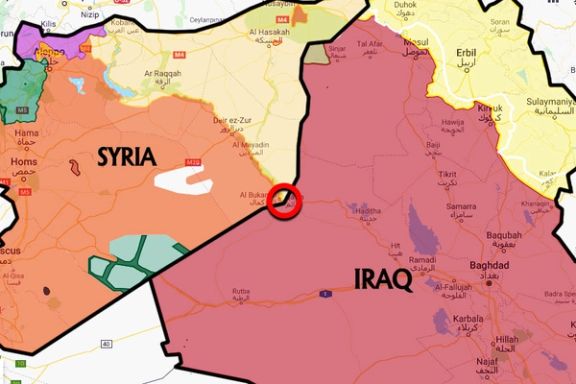
Whether the air strike is confirmed or not, tensions in the region are rising, with more military action taking place on the Israeli-Lebanese border between the Iran-backed Hezbollah and the Israeli army.
On Friday, Israel conducted a series of extensive strikes against Hezbollah targets in Lebanon, attacks which have impacted the Iran-backed group's positioning near the border.
"We continue intensive strikes to hit Hezbollah's deployment close to the northern border," military spokesman Rear Admiral Daniel Hagari said in a televised statement. "It no longer looks as it did on October sixth, nor will it."
Hezbollah has been trading fire with Israel at the border since its Palestinian ally Hamas attacked Israel on October 7, igniting a conflict that has drawn in the heavily armed group and other Iran-aligned factions across the Middle East.
But the violence has largely been contained to areas at the border, shaped by what observers have called unwritten rules of engagement between adversaries that have long threatened each other with catastrophic damage in the event of war.
Israel has said it is not seeking to open a front in the north. Israeli Prime Minister Benjamin Netanyahu has warned that Beirut would be turned "into Gaza" if Hezbollah started an all-out war.
Hagari said the targets of the recent air, tank and artillery strikes included launch pads, military compounds and militant squads.
At the same time, Iran is also apparently not keen to see a full war for its most important proxy force in the region, while Tehran faces a serious economic crisis and has to foot the bill if Hezbollah and its Shiite supporters in Lebanon sustain major losses.
However, Iran continues to use its proxy forces in Syria, Lebanon and Yemen to attack US and international interests, with more than 100 drone and rocket attacks against US forces alone. The Yemeni Houthis have also partially paralyzed the Red Sea with attacks on international shipping.
Many former US officials and Republican lawmakers in recent days have criticized what they say is President Joe Biden's leniency on Iran and have demanded a tougher approach. Some like Senator Lindsey Graham and former national security advisor John Bolton have gone further and called for directly targeting Iran.
“It's clear Tehran does not feel pressured enough to refrain from force,” Bolton wrote in an op-ed for the Telegraph.” I believe that only when Israel, America, Britain, and others show they possess the resolve and capability to impose significant costs on Iran as punishment for such acts, will they persuade the ayatollahs to halt further attacks.”
Iran denies any role in such attacks, maintaining that all operations are planned and executed independently by its affiliated armed groups (or the Resistance, as the Islamic Republic officials call it).
Iran, for its part, has put on a visibly combative tone, ridiculing warnings and ultimatums, accelerating its enrichment program, even threatening to turn Tel Aviv to ruins, ‘“if anyone dares attack Iran.”
Many fear that the hardening of language on all sides might lead to direct confrontation and eventually an all-out war.
Former Israeli PM Naftali Bennett wrote an op-ed in Wall Street Journal on Friday, calling on the US and Israel to “take on Iran directly.”
“Iran is a terror octopus,” Bennett said, “its arms —Hamas, Hezbollah and the Houthis— are sowing chaos and terror across the world. It’s time for the US and its allies to target its head, Tehran, and bring down its regime.”
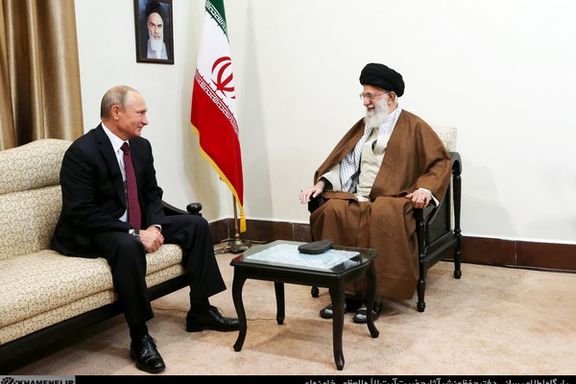
A member of the Iranian parliament's national security commission has asserted that Russia cannot treat Iran as a mere "trump card or playing card."
Ebrahim Azizi underscored that the resilience of Russia's "glass palace" is directly linked to Iran's power and influence in the region.
Tehran and Moscow have been close political and military allies in the Middle East and the wider region for the past decade.
The declaration comes in response to Moscow's public endorsement of Arab claims to three strategically important Iranian islands in the Persian Gulf.
In a joint declaration issued in Morocco, Russia and the Persian Gulf Cooperation Council (GCC) openly expressed their support for the United Arab Emirates, which lays claim to sovereignty over the islands. The ongoing discord surfaces every time during joint summits between the GCC and the Russian Federation, operating within the framework of Russian-Arab Cooperation.
Criticism has emerged from various quarters in Iran, including the media, opposition activists, and the general public, who perceive the regime's response to Russia's alignment with Arab states as inadequate.
Despite historical and geographical evidence validating the islands' connection to Iran, the United Arab Emirates consistently asserts its claim, characterizing the situation as the "continued occupation by the Islamic Republic of Iran."
Originally under British control in 1921, the islands took on new significance when, on November 30, 1971, just two days before the UAE officially federated, the Iranian navy secured control. Presently, Iranian forces maintain control of the islands, with only Abu Musa hosting a population of fewer than two thousand civilians.
Russia's alignment with Arab states has ignited discussions within Iran about the potential exploitation of Moscow's ties with Tehran in recent years, raising concerns about the geopolitical implications of the alignment.